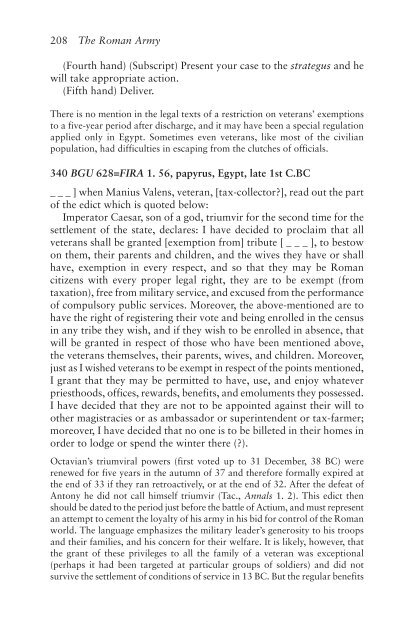The Roman Army, 31 BC–AD 337: A Sourcebook
The Roman Army, 31 BC–AD 337: A Sourcebook
The Roman Army, 31 BC–AD 337: A Sourcebook
Create successful ePaper yourself
Turn your PDF publications into a flip-book with our unique Google optimized e-Paper software.
208 <strong>The</strong> <strong>Roman</strong> <strong>Army</strong><br />
(Fourth hand) (Subscript) Present your case to the strategus and he<br />
will take appropriate action.<br />
(Fifth hand) Deliver.<br />
<strong>The</strong>re is no mention in the legal texts of a restriction on veterans’ exemptions<br />
to a five-year period after discharge, and it may have been a special regulation<br />
applied only in Egypt. Sometimes even veterans, like most of the civilian<br />
population, had difficulties in escaping from the clutches of officials.<br />
340 BGU 628=FIRA 1. 56, papyrus, Egypt, late 1st C.BC<br />
_ _ _ ] when Manius Valens, veteran, [tax-collector?], read out the part<br />
of the edict which is quoted below:<br />
Imperator Caesar, son of a god, triumvir for the second time for the<br />
settlement of the state, declares: I have decided to proclaim that all<br />
veterans shall be granted [exemption from] tribute [ _ _ _ ], to bestow<br />
on them, their parents and children, and the wives they have or shall<br />
have, exemption in every respect, and so that they may be <strong>Roman</strong><br />
citizens with every proper legal right, they are to be exempt (from<br />
taxation), free from military service, and excused from the performance<br />
of compulsory public services. Moreover, the above-mentioned are to<br />
have the right of registering their vote and being enrolled in the census<br />
in any tribe they wish, and if they wish to be enrolled in absence, that<br />
will be granted in respect of those who have been mentioned above,<br />
the veterans themselves, their parents, wives, and children. Moreover,<br />
just as I wished veterans to be exempt in respect of the points mentioned,<br />
I grant that they may be permitted to have, use, and enjoy whatever<br />
priesthoods, offices, rewards, benefits, and emoluments they possessed.<br />
I have decided that they are not to be appointed against their will to<br />
other magistracies or as ambassador or superintendent or tax-farmer;<br />
moreover, I have decided that no one is to be billeted in their homes in<br />
order to lodge or spend the winter there (?).<br />
Octavian’s triumviral powers (first voted up to <strong>31</strong> December, 38 BC) were<br />
renewed for five years in the autumn of 37 and therefore formally expired at<br />
the end of 33 if they ran retroactively, or at the end of 32. After the defeat of<br />
Antony he did not call himself triumvir (Tac., Annals 1. 2). This edict then<br />
should be dated to the period just before the battle of Actium, and must represent<br />
an attempt to cement the loyalty of his army in his bid for control of the <strong>Roman</strong><br />
world. <strong>The</strong> language emphasizes the military leader’s generosity to his troops<br />
and their families, and his concern for their welfare. It is likely, however, that<br />
the grant of these privileges to all the family of a veteran was exceptional<br />
(perhaps it had been targeted at particular groups of soldiers) and did not<br />
survive the settlement of conditions of service in 13 BC. But the regular benefits



